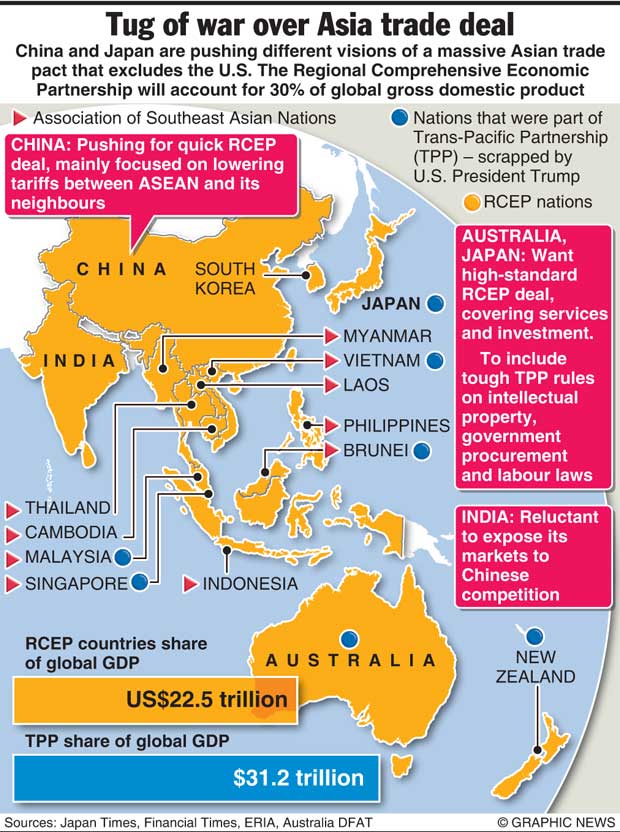Reply To:
Name - Reply Comment
Last Updated : 2024-04-24 03:56:00
 On January 1 last year, this column drew attention to what was then a subtle move to formalise a new geopolitical region dominated by an alliance between India and the United States. The backdrop was a nascent cold war between the US and China.
On January 1 last year, this column drew attention to what was then a subtle move to formalise a new geopolitical region dominated by an alliance between India and the United States. The backdrop was a nascent cold war between the US and China.
Till 2015, the term Indo-Pacific was largely a biogeographic term. The term has now assumed geo-political connotations. During Donald Trump’s recent 12-day Asia tour, the use of the term Indo-Pacific in statements was so profuse that one could not resist the assumption that there are hurried moves to win recognition for the new region. That the  term is also being liberally used in political discourses in Japan is no coincidence.
term is also being liberally used in political discourses in Japan is no coincidence.
The institutionalisation of the new geopolitical region, on the one hand, underlines a ‘rising India’, and on the other, exposes Washington’s eroding power in world affairs and its willingness to work with New Delhi to top up the power deficiency vis-à-vis China: May be it is a readjustment of the US policy giving India an upgraded role.
In recent decades, successive US administrations have been using India as a lynchpin to check China. India, which views China as a frenemy, apparently feels flattered, though it is not unaware that Washington is manipulating it against China.
India’s relations with China have been sticky since the 1962 Sino-India border war. Unresolved border disputes, China’s military assistance to Pakistan, its opposition to India’s full membership in the Nuclear Suppliers Group and China-controlled Maritime Silk Road sea ports in India’s neighbourhood prevent normalisation of ties though trade relations have been growing at a healthy rate.
The formalisation of the Indo-Pacific region also reveals that the United States’ ‘Pivot-to-Asia’ policy, which had originally been devised for the Asia Pacific region, now includes the Indian Ocean region.
Given China’s ambition to extend its Maritime Silk Road all the way to Africa’s western coast and beyond, the term Indo-Pacific may incorporate the Western Pacific Ocean and the entirety of the Indian Ocean, the third largest ocean after the Pacific and Atlantic oceans.
More than 80 percent of the world’s seaborne trade in oil transits takes place through Indian Ocean choke points, with 40 percent passing through the Strait of Hormuz, 35 percent through the Strait of Malacca and 8 percent through the Bab el-Mandab Strait. China’s energy security hinges on the stability of Indian Ocean sea lanes, with some 75 percent of its oil imports coming from West Asia and Africa. All China-bound cargo ships from Indian Ocean enter the South China Sea where Beijing is embroiled in territorial disputes with several littoral nations.
Thus, the Maritime Silk Road with a series of Chinese-managed ports in littoral states has a military dimension. It is quite natural for the US and India to entertain serious apprehensions about China’s entry into the waters they have been dominating for decades.
In yet another move to reinforce the Indo-Pacific concept, on the sidelines of last week’s ASEAN plus summit, officials of the United States, India, Japan and Australia held a meeting to revive the ‘quadrilateral military alliance’.
Downplaying the Indo-Pacific concept, China’s foreign ministry spokeswoman Hua Chunying said the region remained important and had great potential, regardless of “whatever concept or term is employed”.
However, China’s official English language mouthpiece, the Global Times, saw the development as worthy of an editorial topic.
“Indo-Pacific countries have been strengthening trade and cultural ties with China with the facilitation of the China-led Belt and Road initiative,” the editorial said adding that the US and Japan had little leverage to play geopolitical games in the region, and few countries were willing to fall into the orbit of Washington and Tokyo.
Commenting on India’s new role, the Global Times said, “India has its own trick to play. In the past, the mainstream media in India was obsessed with competing with China on GDP growth and international status. Now they are keen to compare their country to Australia or Japan to see which can curry more favor from the US. After the US began using the term “Indo-Pacific,” some Indian media outlets were ecstatic that their country had become an important pillar of this new US strategy.”
If we leave aside military aspects, the new region, in an economic sense, is a gold mine of trade opportunities. This is why states like Sri Lanka are advised to stay clear of power games the big nations play and try through bilateral and multilateral diplomacy to promote the region not only as a mega economic zone, but also as a peace zone.
In this context, an Asian economic union sans power politics is quite in order. China has openly called for an Asia for Asians and made this week, yet another effort to bring to fruition the Regional Comprehensive Economic Partnership (RCEP). In what is seen as a victory for China, leaders of 16 countries—ten ASEAN nations plus China, Japan, India, South Korea, Australia and New Zealand -- discussed the RCEP at a meeting in Manila on the sidelines of the ASEAN summit.
The China-led trade deal was once seen as a rival to US-led Trans-Pacific Partnership (TPP), a project floated by the then US President Barak Obama who declared that the laws of the global economy should be written by the United States and not by the likes of China. Some of those countries which took part in the RCEP talks in Manila this week are TPP members. They were left high and dry when President Trump withdrew the US from the TPP.
With Trump trumpeting about his ‘America First’ policy and subscribing to the view that the TPP would be more beneficial to others than the US, trade ministers of the remaining 11 TPP nations held a meeting, on the sidelines of the APEC summit in Vietnam last week, to give new life to the grouping with or without the US. It is interesting to note that while Trump at the APEC summit was sending mixed signals to Asian nations, China’s President Xi Jinping was wooing them with economic assistance and a willingness to give leadership to the globalization process.
The US is losing its leeway in the region. With a beleaguered president in the White House, the process will be faster.
The way forward for the states in the Indo-Pacific region should not be one of conflicts. What the region needs is economic prosperity which can come only through peaceful co-existence in keeping with the hallowed Pancha Sheela principles which the countries in the region hold in high esteem. The quadrilateral alliance formation is certainly not a confidence-building measure to keep the Indo-Pacific region as a region of peace. India, Japan and China should give leadership to an Asian economic union – a win-win situation for all -- through mechanisms such as the RCEP to bring peace and prosperity to the region.
A Patabendige Tuesday, 21 November 2017 06:02 AM
On the spot.Asia does not need the West to tell it what to do and whom to support

Add comment
Comments will be edited (grammar, spelling and slang) and authorized at the discretion of Daily Mirror online. The website also has the right not to publish selected comments.
Reply To:
Name - Reply Comment
On March 26, a couple arriving from Thailand was arrested with 88 live animal
According to villagers from Naula-Moragolla out of 105 families 80 can afford
Is the situation in Sri Lanka so grim that locals harbour hope that they coul
A recent post on social media revealed that three purple-faced langurs near t